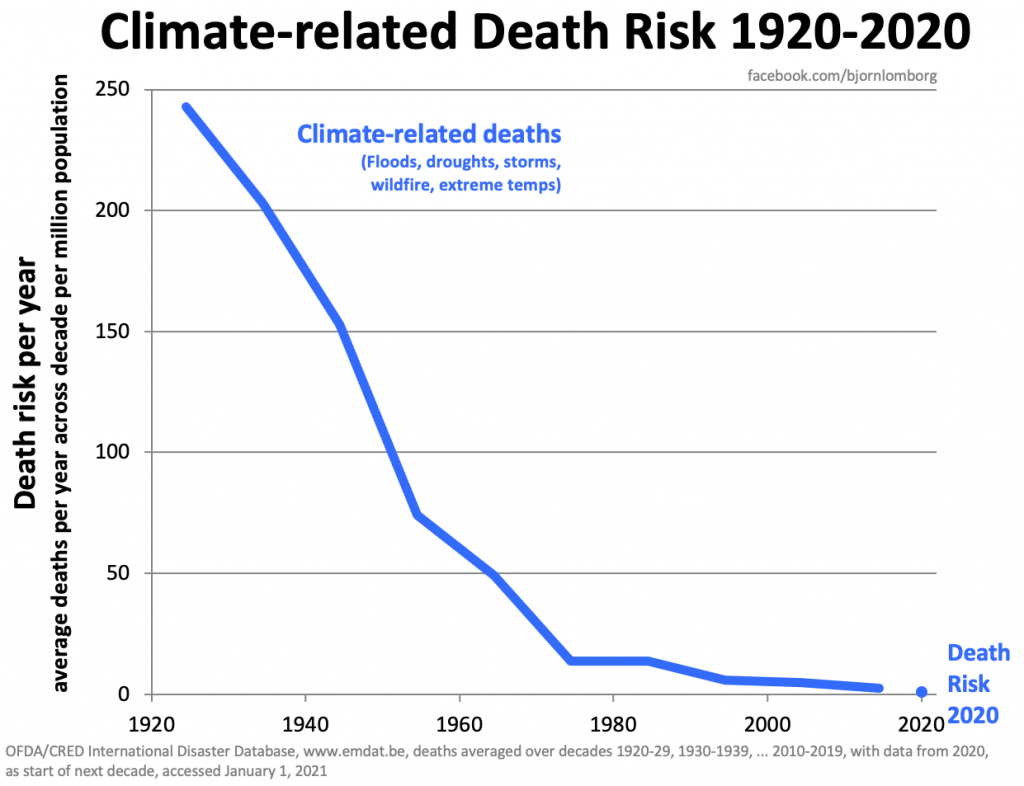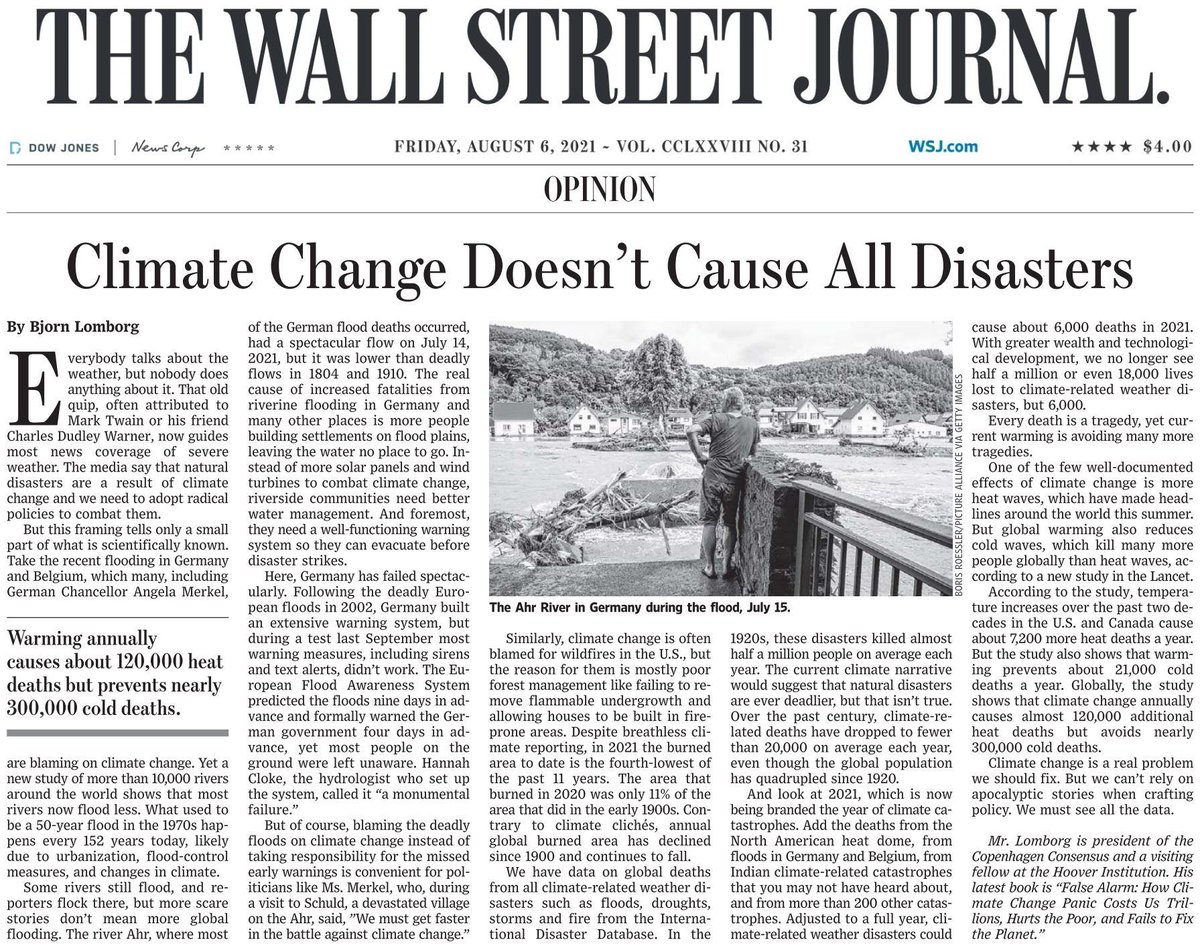This news shouldn’t surprise you a bit, but given the global warming hysteria it might still do so.
According to a study published in The Lancet, cold weather is far more deadly than excessive heat. In fact, for every person in the world who dies due to some heat-related cause, 9 die due to excessive cold.
Common sense and the barest knowledge of history tells us this, and The Lancet’s study merely confirms (and amplifies) what every sentient human being already knows. It’s not like there are mass migrations of human beings from warmer climes to colder ones. People rarely retire to Siberia or even Minnesota. The flow goes the other direction.
Cold kills much more than heat on every continent
US+Canada: 20K heat but 171K cold (8x more)
Europe 179K vs 657K cold (4x)
Africa 1.2m cold deaths
Asia 2.4m cold deaths
Yet, most reporting focus on heat deaths, because it fits the climate narrativehttps://t.co/4k5eU2IaGa pic.twitter.com/TqdUxGwJ6H
— Bjorn Lomborg (@BjornLomborg) November 26, 2022
…
Cold kills much more everywhere
But we don't hear
Reporting focus on heat deaths, because it fits the climate narrative
Here is the full, academic overview of heat and cold deaths 2000-19https://t.co/4k5eU2r7Ea pic.twitter.com/O6xLa9Mdaw
— Bjorn Lomborg (@BjornLomborg) November 26, 2022
There is a reason why the Medieval warm period has been referred to as a “climate optimum”–it was a time when the range of human flourishing expanded greatly. Grapes were grown in Great Britain, and agriculture thrived throughout Europe. A warmer climate was far better for human beings than previous or subsequent periods. Go back 10 millennia and much of the Northern hemisphere was covered in ice, and the human population was measured in the millions, not billions.

A cold Earth is a nearly dead Earth. A warm Earth is filled with life. Go to the tropics, then visit northern Canada. The difference is stark.
If you look at the world population chart you will notice that industrialization and population are correlated. As energy use per capita grew, the number of people exploded. Much of that is due to improved medical technology, but even more of it is due to the increase in our ability to feed ourselves through industrialization.

If you are excessively worried that the human population is outgrowing its ability to feed itself, fear not. As our population has skyrocketed over the past few decades the growth rate has slowed drastically, and will continue to do so. If I were you I would worry more about the rapid aging of our population than being overwhelmed in a Soylent Green population bomb. This is one reason why pro-natalists are worried so much–as the population ages out our social welfare states will be put under greater and greater strain.
Perhaps, though, that too will be overcome by technology. Japan is struggling with these issues and is trying to adapt to changing demographics. Immigration is not on the table there, unlike in many Western countries for good or ill.

A quick view of the geographic distribution of population over time also reaffirms my assertion that we need not fear a warming of the Earth’s effects on human well-being. As you can see, human population has traditionally been concentrated around the equator, and to a great extent still is. Our ability to live in colder climates is an adaptation, not a normal optimal condition for human flourishing. Nobody’s vision of the Garden of Eden includes snow, because cold sucks.
The only arguments for worrying about global warming that have any traction with me have to do with changes to the ocean flows and chemistry. The ocean has far more impact on climate and weather conditions than the chemistry of the atmosphere. It is an enormous heat sink, distributes energy around the globe (which is why much of Europe is quite temperate despite being at high latitudes), and of course we know little about the ocean’s ecosystems.
Were I a climate scientist I would focus my efforts on two things in particular: the effects on ocean life of changing ph values, and the effects of melting Greenland glaciers on the heat flow in the Atlantic. We know far less about these things than we should, and much of the research is filled with more scaremongering projections than actual concrete knowledge.
We do know, though, that vast amounts of fresh water has been dumped into the oceans in recent times. The melting of the glaciers 10-15 millennia released unimaginable amounts of water into the oceans, and at least at that time the effects appear to have been for the better, not worse.
We often hear scare stories about 1 to 2 feet of sea level rise–for which there is sparse evidence–without any context. Since the last glacial maximum a few millennia ago sea levels have risen by hundreds of feet.

20,000 years ago the sea level was around 400 FEET lower than it is today. That is an astronomical amount of water that poured into oceans in a geological eyeblink–and as all that cold water flowed into the world’s oceans the human population exploded from less than a million to 8 billion. Any projected increase of sea levels from the melting of the world’s glaciers would literally be unnoticeable on this chart.
…
Which gets us back to The Lancet study. Excessive heat is 1/9 as likely to kill a person as excessive cold, yet all we hear about is heat waves and heat misery.
The facts clearly don’t back up the Narrative™, but as usual the facts are utterly irrelevant.
#
Related Links:
3 New Studies Conclude 21st Century Cold Temps Led To 7-10 Times More Deaths Than Warm Temps
Paul Homewood: “No mention in the article or the press release whatsoever about the number of cold-related deaths, which number in the tens of thousands each year…And significantly the senior author, Antonio Gasparrini, himself confirmed that cold kills more than heat throughout the world in another paper back in 2015.” …
“Needless to say their numbers are the product of computer models, which have no relation with reality. But the long list of funders, including the NERC and the EU Horizon Project no doubt got the headlines they wanted.”
But climate reality disagrees: After 100 years of climate change, ‘climate-related deaths’ approach zero – Dropped by over 99% since 1920

Climate activists are setting the stage for this:Calls to add ‘climate change’ to death certificates – New study demands ‘climate change’ be added as ‘pre-existing condition’



